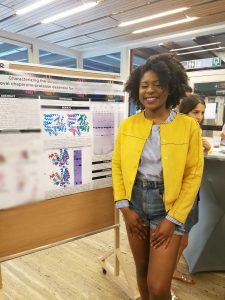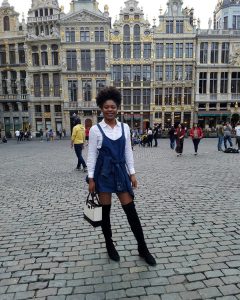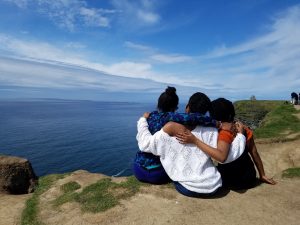Anticipation buzzes across the blacked-out stage. In the wings, we ready ourselves. After a hundred hours of rehearsal, this moment comes at us at warp speed. Lights up, music on, action!
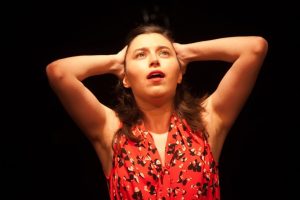
Didem Uca in LOVE in contact, July 14 and 15 at Theaterhaus Berlin Mitte
LOVE in Contact was a theater project devised by a team of thirteen individuals from different national, cultural, and linguistic backgrounds, the culmination of six months of exploring love in all its facets. As both a researcher of contemporary migrant, multilingual, and transnational cultures in Germany and a lifelong thespian, I could feel my scholarly and creative sides coming together in ways I could not have imagined when I first began my Research Fellowship at Humboldt University of Berlin’s Institute for German Literature exactly ten months prior.
In my dissertation, I analyzed 20th and 21st century German-language novels and memoirs about young migrants and refugees. While my ‘day job’ took place in lecture halls and libraries, in the evenings, I explored the city’s rich cultural offerings, including attending performances of both traditional repertoire and avant-garde productions at theaters such as the Maxim Gorki and Ballhaus Naunynstraße, which produce plays by and for communities from migrant and refugee backgrounds. I also participated in Youngcaritas Kulturbuddys, a group that brings together 18-27-year-old refugees and non-refugees for cultural excursions. When the leaders of that group invited me to participate in a new theater project, I jumped at the chance to transition from scholar and audience member to creative writer and actor.
Collaborating with the cast and crew felt like putting theory into practice; it gave me first-hand experience of the kinds of transcultural labor performed by the writers and protagonists I examine in my research, simultaneously enriching my understanding of transnational, multilingual art forms and my own self-understanding as a Turkish-American PhD Candidate in German studies. Writing and performing in this production and even helping to create the sets has invigorated my desire to become an active participant in contemporary German culture rather than a mere observer. I also feel encouraged to incorporate the arts in my teaching, scholarship, and activist work so that students and members of the community may feel inspired to make German culture their own.
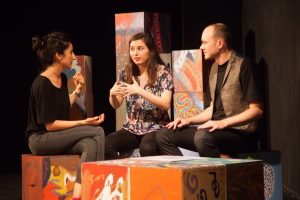
Left to right: Ebru Duman, Didem Uca, and Frederik Bechtel in LOVE in contact, July 14 and 15 at Theaterhaus Berlin Mitte
My advice for Fulbrighters about to begin their journeys and for prospective applicants envisioning their grants is to seek out opportunities for community engagement and creative practice, as these are just as vital a part of your role as cultural ambassador as your research and teaching. You can learn about opportunities for engagement by following cultural organizations on social media, scouring your host university’s bulletin boards, reading the arts and culture sections of local newspapers, and even Googling, which is how I found out about Kulturbuddys.
Senator J. William Fulbright defined the “essence of intercultural education” as the “acquisition of empathy––the ability to see the world as others see it, and to allow for the possibility that others may see something we have failed to see, or may see it more accurately.” Theater, like all forms of creative expression, can bring people into contact with new perspectives that challenge their own prejudices, hopefully leading, as Senator Fulbright had hoped, to a more empathetic world. So, how will you spend your time off the clock?

